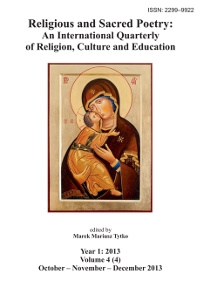Elegický štýl Rainera Mariu Rilkeho a Janka Silana
Elegical Style of Rainer Maria Rilke and Janko Silan
Author(s): Edita PríhodováPublished by: Fundacja Naukowa Katolików »Eschaton«
Keywords: elegy; tension; detension; modernism; Janko Silan (1914-1984); Ján Ďurka (1914- 1984); Roman Catholic priest; Slovak poet; Catholic modernity; Rainer Maria Rilke (1875-1926)
Summary/Abstract: The study focuses on the contrastive comparative analysis of the elegiac poems of R. M. Rilke and J. Silan. In several poetological characteristics, Rainer Maria Rilke and Janko Silan present opposite poetic types (characterized by such fundamental contradictions as intellectuality / emotionality, personality / metapersonality, individualism / sociativity, blocking of tension / blocking of a lack of tension. Rainer Maria Rilke is one of the most canonized figures of European modernism, Janko Silan is a representative of Catholic modernism and belongs to the literature of small nations (Slovak literature). The contrastive comparative analysis allows the perception such connections in the poetic texts of both authors that would stay unnoticed without contrastive literary context. The basic interpretive line is to identify the sources of tension and lack of tension elements in both poets. The interpretation of elegies of both authors has uncovered new knowledge of the fundamental principles of the poetic world of both authors. The tension of The Duino elegies does not lie in personal loss, it is meta-personal philosophizing, intellectual poetry. The lyrical subject experiences a value deficit created by the problematization of life based on traditional values, religious ideas and ideologies. However, the answer does not bring the relief of a lack of tension to the lyrical subject; quite the contrary, the accumulation of questions and answers increases the tension. The problem of the lyrical subject concentrates in the area of the »head«. The sequence of tension motifs has the nature of intellectual problematization. Janko Silan in the poem Slávme to spoločne (Let's Celebrate it Together) discusses the life and death of his mother. The poem is thus marked by the author's biographical context. The discursivity is characterized by dialogue and emotionality that are caused by the autobiographical nature of the topic. The problem of the lyrical subject is concentrated in the area of the »heart«. The Christian ideological framework makes that author initially block the tension (sadness) and focuses more on the celebration. Although Janko Silan does not find a problem in the traditional Christian religious framework, he subjectivizes it by creating a personal spiritual world where the focus is on a connection with the dead ancestors (with his mother). The common ground in the approach of both authors is that through an elegiac genre framework they have expressed views on major literary themes: life, death, love (personal or meta-personal). Although in different ways, both of them achieved the problematization of life based on a simple possession of values. The existence filled with values according to them lies in a deep and open attitude to life, to which a human being accepts and integrates the tension experience.
Journal: Religious and Sacred Poetry: An International Quarterly of Religion, Culture and Education
- Issue Year: 2013
- Issue No: 4
- Page Range: 117-138
- Page Count: 22

